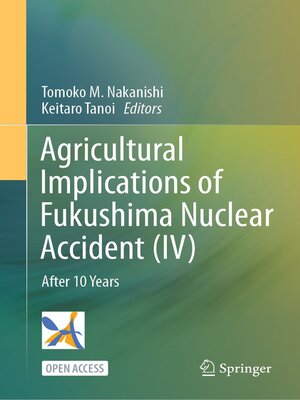Agricultural Implications of Fukushima Nuclear Accident (IV)
ebook ∣ After 10 Years
By Tomoko M. Nakanishi

Sign up to save your library
With an OverDrive account, you can save your favorite libraries for at-a-glance information about availability. Find out more about OverDrive accounts.
Find this title in Libby, the library reading app by OverDrive.



Search for a digital library with this title
Title found at these libraries:
| Library Name | Distance |
|---|---|
| Loading... |
This open access book presents the findings from on-site research into radioactive cesium contamination in various agricultural systems affected by the Fukushima Daiichi Nuclear Power Plant accident in March 2011. This fourth volume in the series reports on studies undertaken at contaminated sites such as farmland and forests, focusing on soil, water, mountain, agricultural products, and animals. It also provides additional data collected in the subsequent years to show how the radioactivity levels in agricultural products and their growing environments have changed with time and the route by which radioactive materials entered agricultural products as well as their movement between different components (e.g., soil, water, and trees) within an environmental system (e.g., forests). The book covers various topics, including radioactivity testing of food products; decontamination trials for rice and livestock production; the state of contamination in, trees, mushrooms, and timber; the dynamics of radioactivity distribution in paddy fields and upland forests; damage incurred by the forestry and fishery industries; and the change in consumers' attitudes. In the series of this book, a real-time radioisotope imaging system has been introduced, a pioneering technique to visualize the movement of cesium in soil and in plants. This is the only book to provide systematic data on the actual change of radioactivity, which is of great value to all researchers who wish to understand the effect of radioactive fallout on agriculture. In addition, it helps the general public better understand radio-contamination issues in the environment. The project is ongoing; the research groups from the Graduate School of Agricultural and Life Sciences of The University of Tokyo continue their work in the field further to evaluate the long-term effects of the Fukushima accident.







